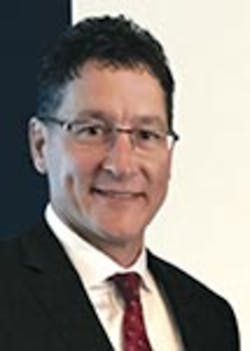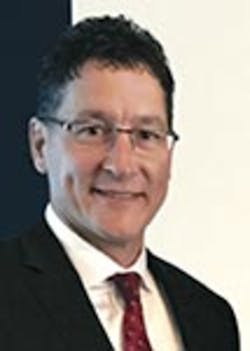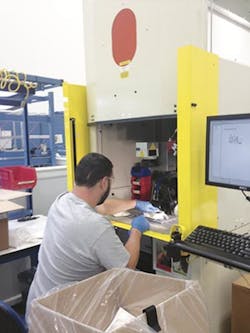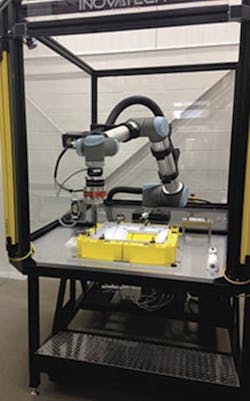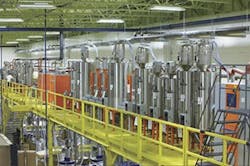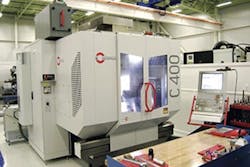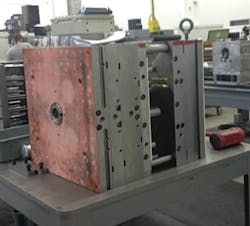Full-service molder PTI stays competitive in fast-changing industry
Injection molder and mold builder PTI Engineered Plastics, Macomb, Mich., has been racking up accolades from its customers. During a Plastics Machinery Magazine tour in June, officials credited hard work and a solid strategy.
PTI has kept its focus on core competencies, which means supporting low-volume production, officials said. Its foundation was built on simple to complex low-volume injection molding. In the beginning, PTI stood for Proto Tech Industries, but the company changed over the years to more of a full-service company, said John Budreau, director of new business development, becoming PTI Engineered Plastics.
Now the company's mantra is "from mind to manufacturing," encompassing industrial design all the way to final assembly, largely as a means to remain competitive in the fast-changing world of injection molding.
"We can do it to the point where it is like contract manufacturing, where a finished device gets shipped from our manufacturing area here," he said. "The other way is diversity. Not only industry diversity has helped and allowed us to stay ahead of the curve, but customer diversity has allowed us to stay healthy and ahead of the curve."
The company emphasizes technology and reinvestment to deliver speed to market, cost and quality.
All that is paying off, according to customers. In July, automotive supplier Yazaki North America, Canton, Mich., named PTI as a 2017 Environmental, Health & Safety
Supplier Award winner. The company also has received Med-Accred injection molding accreditation. This is one of the ways in which the medical industry identifies suppliers that provide superior critical manufacturing processes for producing medical devices, said Joe Pinto, executive VP and COO at the Performance Review Institute, which hands out the recognitions.
PLANNING FOR NEW TECHNOLOGY
Each year PTI puts together a capital plan on the new technology it intends to add. The executive team, including the plant manager and operations manager, are involved in the decisions.
One of the areas the company constantly is working on is metrology, Budreau said, which is critical because 60 percent of PTI's business is in the medical industry.
"With the medical industry, there is a large push and need for validation," he said. The validation process is called IQOQPQ. This stands for installation qualification, operational qualification and performance qualification. In the first stage, IQ, the company confirms a machine is capable of performing a specified task; in the second phase, OQ, the company performs studies to tailor its processes to the specific task.
"You'll pick out three processes where you'll do a low end, nominal and high, and then you'll run each one of those, trying to hone in on what the best process and most repeatable process is so that you can run your PQ, which is your performance qualification, which will be representative of your future production runs," Budreau said.
PTI, which has four coordinate measuring machines, is renovating its building to expand its engineering and metrology areas to accommodate growth and new technology. Once it's completed the renovation, PTI plans to purchase a CT scanner.
INNOVATION IN AUTOMATION
Throughout PTI's facility in Macomb, new uses of technology and innovation are apparent, from its first five-axis machining center, a Hermle C400, for its tooling center to the use of end-of-arm tooling (EOAT). The company uses collaborative robots for low-volume and short runs. They are produced by sister company Inovatech Automation, which PTI started about a year ago.
CEO Mark Rathbone said the concept for Inovatech started five years ago within PTI, and development of the automation assembly equipment was growing. "This allowed us a competitive advantage as an injection molder and assembler to utilize high-tech assembly and robotic press verification for low-volume injection molding and assemblies," he said. "This not only makes us more cost-competitive but it cuts down on scrap and customer concerns.
"We took a different approach to how we were building assembly equipment," Rathbone said. "Building equipment for a specific job function was not a financially cost-prudent way of manufacturing for low-volume injection molding. However, with the medical validation requirements IQOQPQ, we found a way to use three-axis and collaborative robots, assisting us for reaching high levels of quality efficiency and consistent poka-yoke requirements."
Of all the innovations and advanced technology, Budreau said one of the key areas for constant improvement is automation, particularly in the design and production of EOAT and collaborative robots.
"We're utilizing a lot of automation, including end-of-arm tooling; we're using collaborative robots to handle parts, to put inserts and fasteners into parts," Budreau said. "Our goal is to really automate as much as we possibly can for efficiency, even though in some cases there still is a person working at the machine, making sure that work-in-process parts are presented to the robot."
One example highlighted during PMM's tour was an automotive wire routing cover molded from PP on a 750-ton electric Toyo. It was removed from the mold by EOAT attached to a Wittmann 3-axis robot and presented to a collaborative robot that inserted three plastic fasteners into the part before it was packaged.
For its primary processing machinery, PTI has 50 injection molding machines that range from 12 tons of clamping force to 750 tons with shot capacities of 0.33 ounce to 98 ounces. Six of those are vertical presses. Ninety percent of the presses are Toyos and there is a 60-40 split between electric and hydraulic models.
"As we put new ones in place, we are phasing out our hydraulic machines," Budreau said, attributing that to the repeatability and cleanliness of electric presses. "It used to be where it was much more expensive to go to an electric machine, but that is not the case anymore with hydraulic versus electric."
Fifty percent of the products molded by PTI undergo some sort of post-mold process, whether that is pad printing, laser marking, spin welding or machining. For example, an employee was busy laser marking a medical product on the day of the tour.
"It's better than pad printing because that graphic is not going to come off, no matter how rugged," Budreau said.
PTI's auxiliaries include a central materials-handling system from Motan that is designed to handle more than 1,200 different engineered materials. "We are either buying in bags or gaylords," he said, "depending on what the volume is. One CPU and three vacuum pumps drive all material flow."
In the near future, the company also has expansion plans to accommodate growth and improve efficiency. PTI's facility is 155,000 square feet, but officials are looking to expand it by 50,000-60,000 square feet. The plans are underway for that, Budreau said, with a number of layouts being considered.
HIGH-HEAT MOLDING
PTI makes medical device components that require autoclaving and performance in high-temperature environments. The company also makes some automotive parts that must operate in a high-temperature environment.
Therefore, one of the company's specialties is high-heat molding of resins such as polyphenylene sulfide, PEEK, polyphenylsulfone and polyphthalamide. That molding is performed on Toyo presses with clamping forces ranging from 35 tons to 200 tons.
The company has five injection molding machines that are dedicated to this process, with two of those machines located in a high-heat-controlled area. PTI is in the process of buying a third machine and the company also has two machines that are dedicated to high-temperature materials that run outside of the controlled area. The Toyos feature some modifications to components, such as the screws and wiring for the barrel.
The controlled area is necessary because high-heat molding requires a different mindset, Budreau said.
"All the processes are different, the machines are different, in terms of what their capabilities are," he said. "The mold standard is different, so the standard to which we build the mold is different in that area as well. Molds are run between 300 to 400 degrees Fahrenheit, which is very high, whereas some of the other molds that are running in our general environment, someone will not get burned if they touch it. There are a lot of safety considerations. That is why it is segregated and isolated."
MOLD BUILDING
PTI is very proud of its mold-making shop, a state-of-the-art area of about 30,000 square feet, where it produces about 600 new injection molds every year. Here, it has 23 CNC vertical machining centers that are complemented by sinker and wire EDM machines. It is a certified RJG mold builder and try-out facility.
As part of an expansion in 2012, the company added a maintenance program for the molds it uses in-house. Now the company has four employees dedicated to preventive maintenance. It has 52 mold makers, many of whom have their own workstations.
"That number is growing all the time," Budreau said. "In order for us to be able to have the capacity, to have 100 molds in process at one time and meet aggressive deliveries and lead times, our objective is to manage that."
The materials used include aluminum, mild steel, hardened steels and stainless steel to create prototypes, low-volume and hybrid and production tooling.
One of the employees, Scott Kraemer, is exploring the possibilities of laser-sintering tooling inserts from metal powders.
"It is a big push of ours to make DMLS [direct metal laser sintering] part of our process to build tools more efficiently and effectively ... [and] to get conformal cooling in our core geometries of our tooling that require a quicker cycle," Budreau said.
The company has several types of 3-D printers, including stereolithography and fused-deposition-modeling units.
"We can print out soft or hard materials, it just depends on what it is," he said. "A lot are PC or PC/ABS and they're even doing some printing now with Ultem [polyetherimide]. They're doing some high-temperature printing of a cavity and core of a mold."
The company also is still looking at additive technology for metal inserts and inserts that it can use in its tool builds.
"We still are in the evaluation process of what is the right technology solution for PTI," Budreau said. "I expect this decision will also be made after our renovation is complete, maybe in the second quarter of 2018."
Angie DeRosa, managing editor
Just the facts
COMPANY: PTI Engineered Plastics Inc.HEADQUARTERS: Macomb, Mich.OWNER: Mark RathboneFOUNDED: 1984EMPLOYEES: 310ANNUAL SALES: Not disclosed
For more information
Inovatech Automation,Macomb, Mich., 586-210-9010, www.inovatech.com
PTI Engineered Plastics Inc.,Macomb, Mich., 586-263-5100, www.teampti.com
